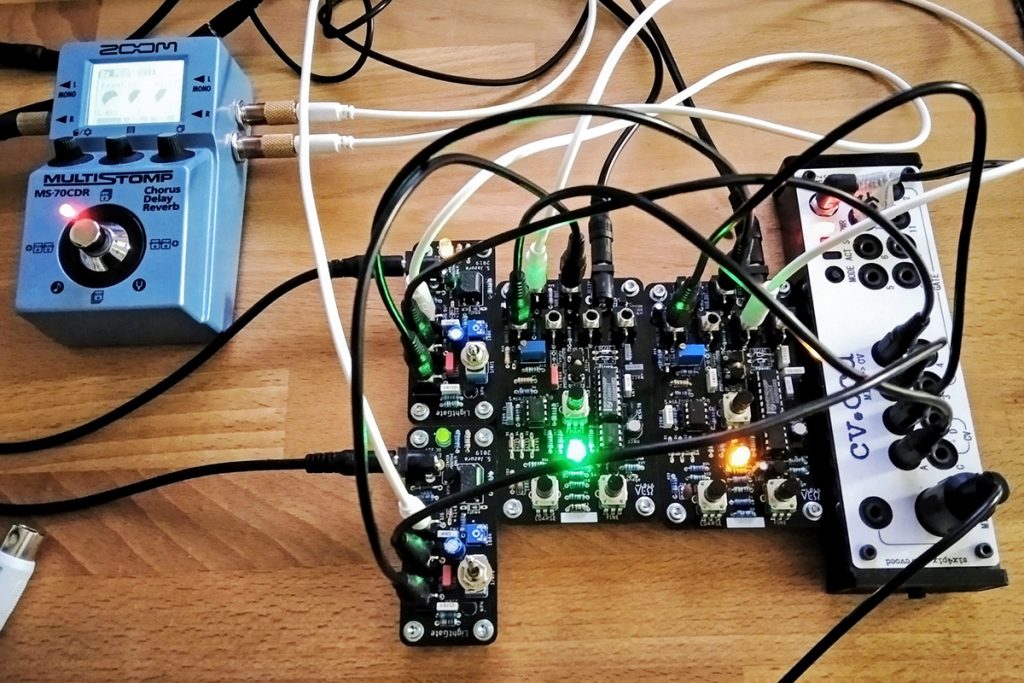Looking back on his years at the KHM alumni Sebastian Jazura describes how his love for old electronics and developing synthesizer came back after finishing his diploma in 2018.
*
After graduating from KHM my focus shifted to experimental (sound)
synthesis again. This was my main field of work before I started at art school.
More than a decade ago I developed the weird habit to collect old electronic devices from bulk waste. I started to desolder the components out of the broken devices and collected them. I wondered what I could build from it, though I looked up some simple synth DIY ideas and found the atari punk console, which is quite famous among the DIY scene. The APC is quite easy to build. But it took me days of desoldering and soldering till I finished one of those sound generators myself. My device was almost completely built from recycled components and I didn’t even used perf board or another kind of carrier material for this.
I guess I came a long way from there. Today I design the circuit boards inside a CAD application, send the files to a manufacturer and have them
produced. The material I mostly order is called FR-4 and I just starting to realize what I could do with it (besides using it for circuit boards). FR-4 is made of an epoxid resin, it’s very sturdy but also inexpensive. You can also make good looking frontpanels for devices from it—some people even make jewellery from this material.

The whole time at the KHM I didn’t build a single synthesizer. But I have learnde a lot about electronics from working on my sculptures and installations.
Today I have a quite extensive knowledge about analog electronics. Often I really can’t completely explain why the things are working the way they do, but I can recognize circuit snippets in schematics and know how they function in them. Even with the most basic operational amplifier applications you can do a lot, if you combine those snippets with each other. If you know how to built a schmitt-trigger and an integrator circuit you can easily design a simple oscillator. If you then start to combine it with other circuits you can do a lot with very little knowledge. Of course you need some basic understanding of electronics. Understanding Ohm’s Law is a good starting point. After a while you can look at schematics and can say quite well what they will output or do, this is a very satisfying experience—at least for me.

Though I often spend countless hours reviewing the service manuals and schematics of legendary synthesizers. Often I end up using snippets of these circuits in my designs. That’s the nice thing about those simple analog circuits: you can find tons of inspiration in these old service manuals and you are free to use it and build your own thing out of it—you could even clone it.
Most of the analog synth circuits aren’t patented anymore or never had a patent, because they are based on common electronical designs and applications. You would be suprised in how many commercial synthesizers you can find a remixed version of the Korg MS-20 filter—it is basically in every third analog synthesizer.

But building synthesizers with a common internal structure isn’t what I found exciting. I am mostly interested in more experimental ways of synthesis and modulation. I use ring modulators a lot, and also shift registers to create some form of pseudo random voltages. I often focus on a simple sound generation and combine it with good sounding filters and a lot of modulation sources.

Overall there is alot of (pseudo) randomness and undetermined stuff going on in my builds. Randomness is also the link to the rest of my Œuvre. It is most of the time the underlying topic and combines all of my works with each other.”
Sebastian Jazura (Alumni, Diploma in 2018)
*
Under this heading “thinking about / working on” we normally focus on current projects and thoughts happening in the vicinity of exMedia. This time we talked with an alumni who contributed his answers as a short text.
In regular intervals the questionnaire series “thinking about / working on” features projects and processes of students and teaching staff, asking them to share thoughts on their current topics and give insight into their practice. The questions vary slightly and can be adapted by the interviewee. The questionnaire series is edited by Karin Lingnau. If you are interested to take part feel free to contact me.